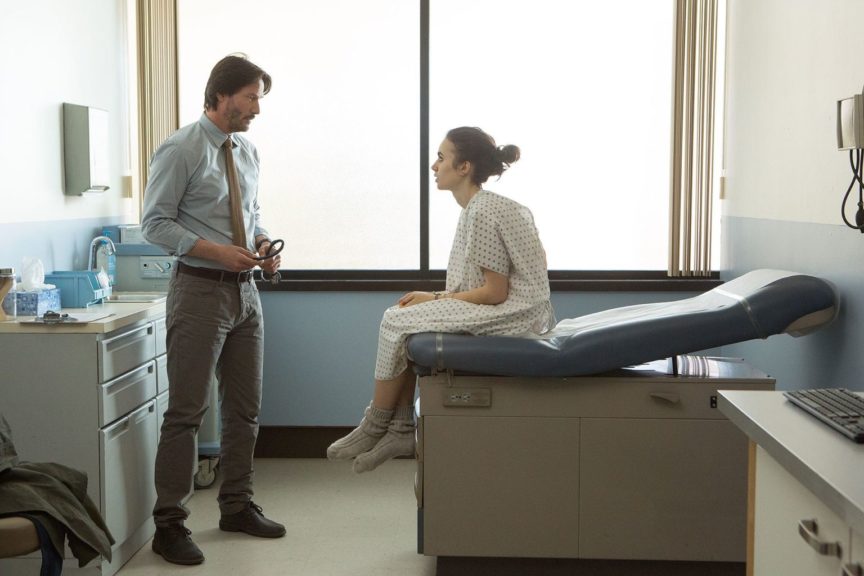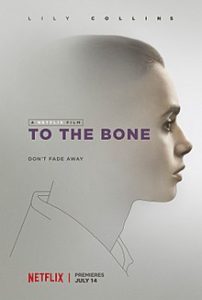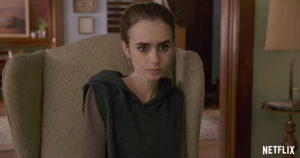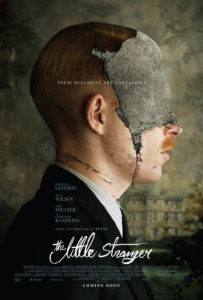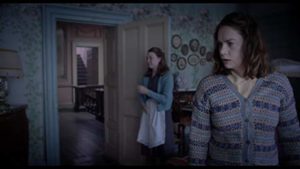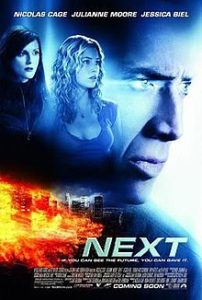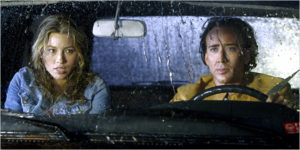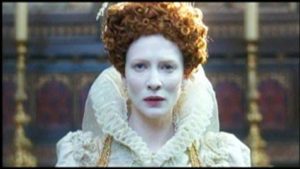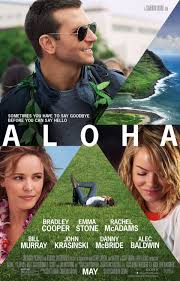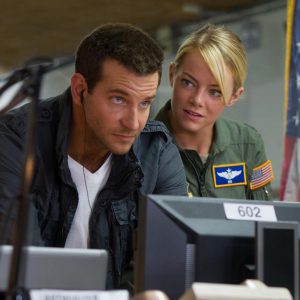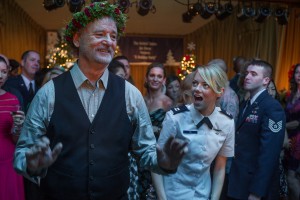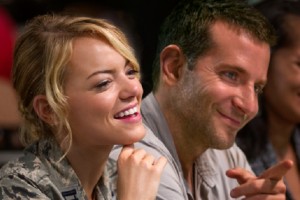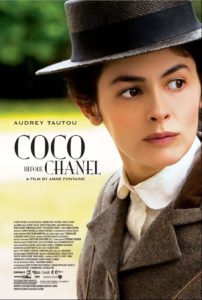To The Bone
The first feature directed by Marti Noxon, whose name I’ve always associated with Buffy The Vampire Slayer. She also worked on Sharp Objects, the noirish HBO drama with Amy Adams who played a character with an addiction to self-harm. To The Bone is about Ellen (Lily Collins). She’s 20 and anorexic, or “rexy” as she calls it. She has a flaky mother (Lily Taylor, who’s now in a relationship with Brooke Smith), a totally absent father, and a goofy stepmother, played by Carrie Preston, who at least cares about Ellen’s health. Liana Liberato is Ellen’s step-sister, Kelly.
Ellen gets sent to an in-patient care facility with a bunch of other young women, and one guy, played by Alex Sharp who channels Richard E Grant. He’s great in this, part of a solid ensemble without a weak link. Keanu Reeves is the doctor at the facility, and he shines. With age he’s earned a little gravitas. For a guy in his 50s who’s fallen off his motorcycle a few times, he moves with a lot of grace.
At its best, To The Bone gets close to the great youth-in-care picture Short Term 12 but once too often indulges in Disease of the Week genre cliches. There’s a problem when the protagonist has some kind of spiritual revelation and the movie ends just as the hard work begins.
The Little Stranger
How is it that the new feature by Irish auteur Lenny Abrahamson—whose last two features were the excellent Frank and Oscar-winning Room—get released with no fanfare on Netflix? When the film is a hard-to-market period drama that looks like it might be a ghost story, but isn’t really—it’s much more a mood piece, and a drama that considers class.
We’re in post-WWII rural England, where a youngish doctor, Faraday (Domhnall Gleeson, solid), looks in on the troubled, moneyed family down the road. The man of the house, Roderick (Will Poulter), suffers from terrible wounds suffered in war, but Faraday is more interested in Roderick’s sister, Caroline (Ruth Wilson). The matriarch (Charlotte Rampling) believes their decaying manor houses a ghost, perhaps of her first daughter who died as a child. Faraday’s mother was a housemaid in this place 20 years earlier, and he’s spent a life fascinated by the world of wealth and status he could never be part of.
The suggestion of the ghost haunts (ahem) the picture, but Abrahamson (with screenwriter Lucinda Coxon, based on a novel by Sarah Waters) is more interested in the character beats: Faraday is tortured by shame and the memory of his mother’s heavy hand, while Caroline is simply trying to take control of her life, and leave behind the past and maybe that gloomy mansion, too. The film is Gleeson and Wilson’s, and their chaste, repressed connection is what keeps the interest, along with the gorgeous sets and moody cinematography.
There’s a subtle treatise here that one’s id has supernatural potency, which you can take or leave in the frame of these terminally repressed Brits. If, in the end, the emotional wallop that simmers throughout never quite comes to a boil, the time it takes to get there is better-than-compelling cinema. Abrahamson’s touch hasn’t deserted him.
Next
Philip K. Dick’s back catalogue has been raided by Hollywood. The strangely prophetic writer’s preoccupations with memory and drugs and identity resonate through the decades. Film adaptations of his stories have been groundbreaking (Blade Runner), confounding (A Scanner Darkly), and an excuse for pointless action (Paycheck).
Next is firmly in the last category. Nicolas Cage, who produced, stars for Kiwi director-for-hire Lee Tamahori (Die Another Day) as Cris Johnson aka Frank Cadillac, a Las Vegas low-rent magician who has the ability to see two-minutes into his own future. The great Peter Falk shows up long enough to allow for a bit of plot advancement (this film is from 2007), and we’re rapidly off into factory-made action entertainment. Johnson has seen further than two minutes only once, when he sees a beautiful teacher (Jessica Biel, beige) who he feels connected to but doesn’t know why. On his trail is an FBI agent (Julianne Moore, embarrassed by the clunky, expositional dialogue) who thinks Johnson can help her find a group of international terrorists bringing a nuke onto US soil.
Next raises a lot of questions but offers few answers. Are the terrorists French? Russian? Why do they want to detonate a bomb? Why does Johnson steal the car at the casino? Why is the CGI so unconvincing? Who made these shoddy interior sets? Why didn’t anyone notice the enormous plot holes?
Of course, none of this matters if you enjoy watching Cage do that thing he does. As magnetic and deadpan as ever, he makes the ridiculous stuff work. And there are moments of both unintentional and unexpected humour, as the whole two-minutes-of-precognition conceit offers some graceful action set-pieces, with Cage waltzing through the bad guys, disarming them completely effortlessly, as he knows exactly what they’re going to do before they do. It also does wonders for his ability to pick up.
Next is trashy, stupid and chock full of empty calories, but it’s not boring. On a rainy, low-expectation Saturday afternoon, it could work on your entertainment needs the way fried egg and sausage quenches a hangover.
Elizabeth: The Golden Age
The sequel to 1998s Elizabeth reunites most of the creative staff from that first movie, producers, director, writer and cinematographer, as well as two of the key cast, but they can’t recreate the magic.
It’s almost 30 years since Elizabeth the First (Cate Blanchett) succeeded to the throne of England, but beside her is still her trusted spymaster, Sir Francis Walthingham (Geoffery Rush), as well as collection of handmaidens to keep her company and help assess potential love interests. One gets the impression that The Virgin Queen could marry, but having taken power through sheer force of will and political smarts, shown at the end of the first film, she ascended and left behind her doubts and weaknesses about what it takes to be queen. She certainly doesn’t need a king. Unfortunately, all those doubts have returned in what feels like a requirement of sequel rather than real character development.
She asks council from an astrologer to show her the right way to confound those damned Spaniards. In the pocket of the Pope, Spanish King Phillip (Jordi Molla) is looking for an excuse to wage war against the bastard, heretic queen and put Mary Queen of Scots on a Catholic throne, while Mary (Samantha Morton) secretly schemes to regain power. Meanwhile, Sir Walter Raleigh (Clive Owen) appears, all wolfish grins and storytelling, seducing the Queen as well as one of her ladies, Bess (Abbie Cornish).
The cast of the first film was filled out with interesting characters, all warring for power in their own way, played by talent including Joseph Feinnes, Christopher Eccleston, Richard Attenborough, Vincent Cassell, John Gielgud, Emily Mortimer and Kelly MacDonald. This picture really only has four characters that resonate at all, the Queen, Bess, Raleigh and Walsingham. Comparatively, their dramas seem very slight. The love triangle in the centre is so soapy and ridiculous, it threatens to capsize the whole enterprise, and the Spaniards don’t really seem a real threat at any point.
What this shares with the original an astonishingly lush art direction, the sets and costumes and hair, all amazing to see. Also, Blanchett speaks in mostly her lower register, an arch, husky voice that resonates. She can make any mouthful of over-the-top dialogue sound real and sincere. It’s great to see her inhabit this role that made her famous.
But I’m afraid I can only really recommend the film to Blanchett completists and set-and-costumes fetishists. Anyone looking for something like the original Elizabeth, a dark, exciting historical monarchist drama, will instead find a bodice ripper—though it might make an interesting double feature with another so-so historical epic, Mary Queen of Scots.
Aloha
Aloha is a movie trying to do a lot. Maybe too much. Its plot rambles here and there without a lot of focus. Here’s the question, then: If problems like this are deal-breakers for most frothy romantic comedies, how come I had such a good time at this one?
The best reason I can come up with: Cameron Crowe, whose work I’ve enjoyed from Fast Times At Ridgemont High right through Almost Famous, is swinging for the fences this time, making a fizzy romcom with shades of geopolitical noir thriller. It’s arguable whether he succeeds at either, but I really enjoyed watching him try. There’s so much going on, with a few subplots that get underserved, there may be a much longer cut of this waiting for us someday on Blu-Ray, an Untitled Lei edition, say. Seems unlikely, as the film was roundly condemned when it opened in 2015, first for directorial hubris, and second for casting—a none-more-white Emma Stone playing a character with native Hawaiian ancestry, which she’s still apologizing for.
Here’s the story: Brian Gilcrest (Bradley Cooper at his most eye- and tooth-sparkling) is coming home to Hawaii after years away. He was a military boy who took a job in the private sector, somehow screwing it up badly, barely surviving a jaunt in Afghanistan. This is his second and probably last chance to do something right, working for billionaire Carson Welch (Bill Murray), helping to swing a deal with the Hawaiians so Welch can build his rocket factories on their land. Or something: his actual job is a little vague, but he seems to be a man with many talents, from negotiation to high-end anti-hacking skills.
Complicating matters is Gilcrest’s ex-girlfriend, Tracy (Rachel McAdams), now unhappily married to a tall, mostly silent man in uniform, Woody (John Krasinski), with two kids. Also in play is Allison Ng (Stone), a hyper-enthusiastic pilot and advocate for the native Hawaiians, an officer assigned to babysit Gilcrest for the few days. Filling out the cast of characters is an old military buddy of Gilcrest’s, Fingers (Danny McBride), and crusty General Dixon (Alec Baldwin).
This is the kind of movie where the plot really should just be background for the actors to charm their way into your affections with lots of scenes of wit and flirting. They do when they’re allowed to, but a little too much time is given over to machinations: whether activist Dennis “Bumpy” Kanahele (playing himself) will allow Welch’s company (which Gilcrest represents) to take the land, or Gilcrest figuring out what Welch is really up to, and what he’s going to do about it. There’s also some business about a rocket launch that feels like it’s wandered in from some other kind of movie. And all this against the strange coupling of the American military and the indigenous culture. Despite his appearance in the film (on the soundtrack and in a photo), this isn’t an Elvis movie.
But here’s the thing: when Aloha works, it’s adorable. If Emma Stone wasn’t already a star, her Ng would be a star-making performance. Her claim to the title of America’s Sweetheart is genuine: she’s irrepressible, like Lucille Ball resurrected, making Cooper look good in her shiny wattage. As Gilcrest, Cooper is fine, but he just doesn’t seem as charming, nor as damaged, as he should be. He lets his grin do most of the work. The hardcore fan might disagree.
My favourite scene takes place at an Officer’s Club, with every major character in attendance. Crowe manages to stage some dynamite banter, and have practically every person throw meaningful glances at everyone else, and at no time do you lose the thread of what’s going on. It’s a classic moment I didn’t want to end. But it does with Bill Murray dancing with Emma Stone to Hall & Oates’ “I Can’t Go For That (No Can Do)”. I’m glad I lived long enough to see that.
Crowe has always had a sharp ear with his soundtrack choices and musical cues. He’s unafraid to mix in the deep cut rock numbers with the score and somehow makes it all work. It brings the right kind of tonal sheen to the proceedings, whether it’s Elvis, the Stones, or, yes, Hall & Oates.
Previous to this, Crowe made the flabby Elizabethtown and the sweet but forgettable We Bought A Zoo. Aloha is not like those movies—it’s flawed but fun, and has a ton of personality. Don’t let the negativity keep you from giving this imperfect, charmingly unique movie a try.
Coco Avant Chanel
Audrey Tautou is the legendary designer Gabrielle Coco Chanel, here depicted in her early life as an orphan and French bar performer who ingratiates herself into the opulent country life of a wealthy businessman, giving her a taste of upper class society and eventually a chance to take her designs to Paris. Not knowing much about Chanel I was amazed at the impact her simple designs had upon western culture—she basically invented sophisticated couture for women in the 20th century. Tautou plays her as willful, judgmental, and ultimately a little tragic, unable to be happy except in her work. The versatile Alessando Nivola (terrific also in Junebug, Disobedience and the forthcoming The Art of Self-Defence) plays Boy, her lover, and is simply amazing… he’s an American playing a Brit who speaks French throughout the film. Director Anne Fontaine keeps things moving at a reasonable clip—this history lesson never feels like homework.





